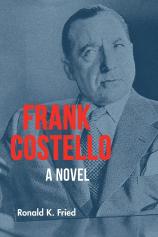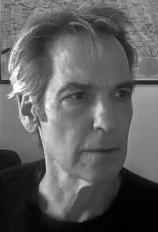Frank Costello
Review
Frank Costello
“A lot of people had to die for me to be me.”
A chilling, memorable line. And historically accurate. That’s the first achievement of FRANK COSTELLO, Ronald K. Fried’s novel about “The Prime Minister of the Underworld.” It’s exhaustively researched, and it reads like nonfiction because much of it is. That’s because Fried is not only the author of two previous novels, CHRISTMAS IN PARIS, 2002 and MY FATHER’S FIGHTER, he’s a veteran TV producer (Dick Cavett, Tina Brown).
The second, and perhaps greater, achievement is that Fried wrote FRANK COSTELLO in the first person. Critics talk about “unreliable” narrators in novels. How about a thoroughly unlikable narrator? And yet so solid is Fried’s writing that I totally believed he had stumbled upon a lost file of Costello’s memoir. (Costello’s comments in published interviews are also from the record, as are published comments by public figures. His inner thoughts and personal conversations are invented.) And even more impressive: I never thought Costello’s story was so appalling that I wanted to put the book down. On the contrary, I developed at least a thimble of empathy for him. [To buy the book from Amazon, click here. For the Kindle edition, click here.]
"I never thought Costello’s story was so appalling that I wanted to put the book down. On the contrary, I developed at least a thimble of empathy for him."
Consider how unlikely that is. Frank Costello (his name at birth: Francesco Castiglia) was the ultimate image of a gangster --- Marlon Brando modeled his voice in The Godfather on him --- whose partners-in-crime included Meyer Lansky, Lucky Luciano and Bugsy Siegel. After some early arrests, he never carried a gun and didn’t go to jail again for 40 years. When he was wounded in an assassination attempt, he retired to his Central Park West penthouse, spent his days cultivating flowers at his second home in Sands Point, and died of a heart attack at 82.
Why care about a gangster?
Because the mild-mannered New York novelist brilliantly imagines gangster-speak:
“Everybody’s weak, it just takes the right situation or the right person who knows how to bring it out.”
“You forget who you are, and the world has a way of reminding you you’re nothing.”
“Poor people never change, they can’t afford to.”
Because he knows where he comes from, and why he didn’t follow his parents’ example and work in their candy store:
“I was ashamed knowing that this was all they made of their lives, nothing more than getting up in the morning and going next door to wait to make a few bucks if they were lucky --- and knowing that this was all my father could do and that he wouldn’t even do that if my mother wasn’t there to drive him. That was their life. He was working for her. She was the boss, and maybe it’s like that in a lot of families, but this was out where anyone in the neighborhood who walked into the place could see who was in charge. It was the old lady in the black dress with her oily black hair tied up behind her head. My old man looked strong with that mustache and the shoulders on him and that grim stare in his eyes, but he had lost the battle between them long ago, and he’d lost his battle with America too.”
Because he has a sense this life doesn’t end well:
“You get big and live big and then you get taken out. We’re all blind men driving a car down a road not knowing what’s in front of us, what’s to the sides, what’s coming towards us, what’s moving in for the kill.”
What is coming for him is the Kefauver Committee on Organized Crime. In 1950 and 1951, that committee summoned 600 gangsters, pimps, bookmakers, politicians and mob lawyers for questioning. Of these, only Costello was eager to testify, even though he knew these sessions were televised and 30 million Americans were watching. His decision and his testimony are the climax of the book. They’re a psychological thrill ride.
Fried has Meyer Lansky try to head him off:
“What they care about is gambling more than anything else. They’re getting headlines by exposing things that people already know about --- bookies in the big cities, casinos in Broward County where the sheriff is our partner. They’re going to go after everybody --- the boys in Chicago, Kansas City --- everywhere. They’re going to make out like we run the world. They’re going to call me to testify, and they’re going to call you. I talked it over with my attorney. Polakoff understands all the angles.”
“Polakoff? You’re still with Charlie’s guy?”
“Why not? He’s a tough cookie. He told me there’s only one thing to do --- take the Fifth.”
“I’ve already been down in Washington. It went fine.”
“These people are not your friends, Frank. Washington is not New York. People like Kefauver and that Tobey from New Hampshire, they never wanted Jews and Italians in their country to begin with. Now they’re trying to keep us in our place. That’s why they took away our booze during Prohibition. So now they’re trying this. It’s the same thing. They want to keep us down.”
“I understand that.”
“Nobody beats the house, Frank. You know that. Remember that when you decide what to do. Think it over very carefully. This may be the most important decision you’ll ever make.”
Costello’s rationale for testifying: “I have to say something. I have to protect my reputation.” What reputation? He’s been on the cover of Time. He’s known as America’s #1 gangster. He’s also befriended politicians --- at one point, he simultaneously ruled the New York mafia and most of New York politics. But on the eve of testifying in Washington, this is how he explains his thinking to his lawyer: The stories about his mistresses will become public. He’ll shame his wife: “I’m more worried about what Bobbie is going to say when I come home.”
The tough guy has a heart? Trust Ron Fried on that.
Reviewed by Jesse Kornbluth for HeadButler.com on December 10, 2022
Frank Costello
- Publication Date: December 1, 2022
- Genres: Fiction, Historical Fiction
- Paperback: 225 pages
- Publisher: Excelsior Editions
- ISBN-10: 143849114X
- ISBN-13: 9781438491141




